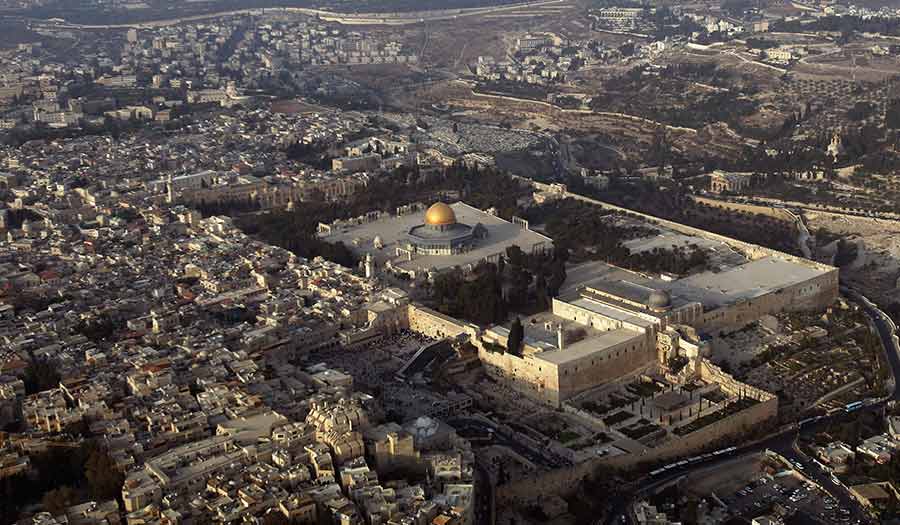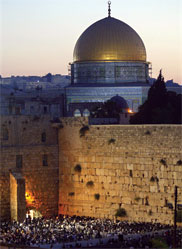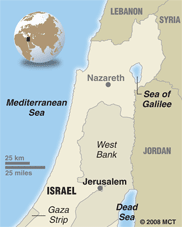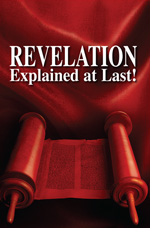 David Silverman/Getty Images
David Silverman/Getty Images
Article
Here is how a city known for turmoil, violence and religious confusion will someday become world headquarters for universal peace.
Learn the why behind the headlines.
Subscribe to the Real Truth for FREE news and analysis.
Subscribe NowJerusalem: The name, among many ancient definitions, means “city of peace”—yet, ironically, it has been the focal point of war, uncertainty, turbulence and religious confusion for thousands of years. Even today, Jerusalem is the center of controversy, with Jews, Christians and Muslims esteeming the ancient city as their particular religion’s holy site, both Israelis and Palestinians wanting it as the capital for their individual states, and the United Nations recommending that Jerusalem be designated an international city.
Israeli Prime Minister Benjamin Netanyahu, having recently returned to office after putting together a fragile coalition of competing political parties and ideologies, faces daunting obstacles. For example:
• Iran continues to flex its military muscles, test-firing a long-range missile capable of striking Israel. Mr. Netanyahu is determined to protect the Jewish state at all costs—even if it means a first-strike to take out Tehran’s nuclear capabilities.
• U.S. President Barack Obama demands that Israel halt all settlement expansion—a move the Palestinian Authority has said must take place before it would restart peace talks with Israel. U.S. Secretary of State Hillary Clinton echoed the president’s demand, telling reporters, “Not some settlements, not outposts, not natural growth exceptions. We think it is in the best interest of the effort that we are engaged in that settlement expansion cease” (BBC).
But the Israeli prime minister remains defiant. A senior official quoted Mr. Netanyahu as telling the Israeli cabinet, “There is no way that we are going to tell people not to have children or to force young people to move away from their families” (ibid.).
Why such contention—where will this lead?
Looking Into the Past
 Pedro Ugarte/AFP/Getty Images
Pedro Ugarte/AFP/Getty ImagesArcheologists, historians and other scholarly experts have their own ideas and opinions regarding Jerusalem’s past. Most either ignore or denigrate the Bible as a reliable source of knowledge. Verifying Scripture’s historical accuracy means legitimizing its spiritual, ethical and moral authority over people’s lives. Human nature will not allow this, for “the carnal mind is enmity [hostile, an enemy] to God; it is not subject to the law of God, neither indeed can be” (Rom. 8:7).
Yet, to understand Jerusalem’s violent past, its contentious present, and the marvelous future the city will soon attain, we must start with God’s Word.
The first time Scripture mentions Jerusalem, it is called Salem, which means “peace.” (Notice Genesis 14:18.) The city eventually became Jerusalem.
When God freed the Israelites from Egypt and led them into Canaan, the Promised Land, He commanded them to completely wipe out all the Canaanites and other pagan worshippers in the land. They were to slay every man, woman and child, sparing no one, regardless of age or gender.
The Canaanites were idolaters, worshippers of numerous false gods. Worse, they offered human sacrifices—even the lives of babies and little children. God knew that if the Israelites allowed pagan worshippers to live around them, they would tolerate their practices, marry into their families, and eventually sacrifice the lives of their own helpless little ones.
In fact, that is exactly what happened. The Israelites, at first, zealously conquered Canaanite cities throughout the land, and achieved great success, thanks to God and the stewardship of faithful leaders, first Joshua, then the elders after his death. But soon, the Hebrews grew tired of fighting, tired of constantly besieging cities and waging war. So they compromised. Instead of wiping out the pagans, Israel suppressed them, forcing the Gentiles to pay tribute. In effect, the Israelites disobeyed God and tolerated sin (which the people of Canaan represented). Israel thought it knew better than God.
But their misguided thinking backfired. The Israelites settled down, grew comfortable…and forgot to put God first. They rejected Him so they could worship the false gods of surrounding nations, pagan deities such as Baal, Molech, Tammuz and others.
A National Religious Center

Meanwhile, one of the many cities Israel left unconquered was Jebus, formerly Salem. Not until hundreds of years later did the Israelites, under King David, permanently seize the city from the Jebusites. David changed its name to Jerusalem, which he designated as Israel’s capital.
The original builders had established the city on two mountains: Zion and Moriah, the place where God ordered Abraham to sacrifice Isaac. David wanted to build a “house for the name of the Lord God of Israel” (I Kings 8:17), so he gathered all the construction materials and had his son Solomon, who succeeded him as king, build the Temple upon Mount Moriah.
The Temple replaced the Holy Tabernacle (Israel had made during the 40-year trek in the wilderness) in Shiloh as Israel’s religious center. Three seasons a year—(1) Passover/Feast of Unleavened Bread, (2) the Feast of Firstfruits (Pentecost), and (3) the Feast of Trumpets/Day of Atonement/Feast of Tabernacles/Last Great Day—families from throughout the kingdom came to Jerusalem to worship God, offer sacrifices and observe the annual Holy Days. The Temple served to unify the nation.
However, after King Solomon’s death, the house of Israel split from the house of Judah, each becoming separate kingdoms. Jerusalem remained Judah’s capital. The northern kingdom, in order to keep its families from traveling to Jerusalem three times a year, established its own religious centers, one in the north (Dan) and one in the south (Bethel), each with its own golden calf to worship. Almost the entire northern kingdom whole-heartedly embraced idolatry. In effect, the house of Israel rejected God; so did all 20 of its kings.
A History of Upheaval
The following is an overview of Jerusalem’s tumultuous past:
1800 B.C. The Jebusites build the wall of Jebus
1350 The name “Jerusalem” appears in diplomatic correspondence as “Urusalim” in five Amarna letters
1004/993 King David captures Jebus; makes Jerusalem the capital of Israel’s united kingdom (II Sam. 5:6-10)
960 King Solomon begins constructing the Temple
928 Israel divided into two separate kingdoms; Jerusalem remains capital of house of Judah
722/721 Assyrian Empire conquers northern kingdom (house of Israel) and exports it into captivity, which becomes the “Lost Ten Tribes” of Israel
701 Hezekiah withstands Assyrian King Sennacherib’s unsuccessful siege of capital, and builds Pool of Siloam tunnel to supply Gihon Spring water to the city
597 Babylonian Empire captures Jerusalem
586 Babylonians destroy city and the Temple, exiling the Jews to Babylon
538/537 Edict of King Cyrus allows the Jews (est. 50,000) to return from captivity and rebuild Temple
516 Second Temple finished in sixth year of Darius the Great (Ezra 6:15-18)
332 Alexander the Great conquers Palestine from the Persians (Dan. 11:3) and captures Jerusalem
320/313 Egypt’s Ptolemy I captures city
170/169 Antiochus IV Epiphanes plunders Jerusalem, outlaws Judaism, and profanes the Temple (Dec. 25, 168 B.C.) by erecting within it an altar to Zeus
167-164 Hasmoneans begin Maccabean revolts; Judah Maccabee recaptures city and restores the Temple and Jewish autonomy
63 Pompey captures Jerusalem for the Roman Empire
37 Rome appoints Herod king of Judea; Jerusalem made capital of Roman client kingdom
19 B.C. Herod begins expanding the Temple Mount and rebuilding the Temple
A.D. 26-36 Pontius Pilate governs as Roman procurator of Judea
27 Temple completed
31 Jesus Christ crucified
66-73 The Jews revolt against Rome
70 Roman army captures Jerusalem, sacks and destroys the Temple; exiles or enslaves survivors
132-135 Bar Kochba leads revolt against Rome; reinstates Jerusalem as Jewish capital
135 Roman emperor Hadrian destroys the city, renaming it “Aelia Capitolina”; bans Jews from entering
313 Emperor Constantine legalizes (false) “Christianity”
326 Queen Helena, Constantine’s mother, visits Jerusalem and determines locations of events supposedly associated with Christ’s last days on Earth; leads to construction of religious sites, including Church of the Holy Sepulchre
361-363 Pagan Emperor Julian the Apostate allows the Jews to return to Jerusalem
614 Persians take over city, destroy most churches and expel the Jews
627-629 Byzantine Emperor Heraculis recaptures city
638 Muslim Arabs capture city, readmitting the Jews
691 Dome of the Rock completed
715 Al-Aqsa Mosque completed
1009 Synagogues and churches destroyed
1071 Seljuk Turks devastate Jerusalem
1099 First crusaders capture Jerusalem and massacre most of the city’s Jews and Muslims
1187 Kurdish general Saladin captures city; permits Jews and Muslims to settle in Jerusalem
1192 England’s Richard the Lion-hearted fails to recapture the city; makes treaty with Saladin, permitting professing Christians to worship at their holy sites
1229 Treaty returns city to the crusaders
1244 Khwarizmian Turks capture Jerusalem, ending Crusader rule; Mamluk Sultans defeat the Ayyubids and rule city, which is back in Muslim hands
1348 Black Death plague hits Jerusalem
1492 Jews arrive following Spanish Exile
1517 In a peaceful takeover, Jerusalem and Palestine become part of the Ottoman Empire
1838 First consulate (British) opens in Jerusalem
1840 Ottoman Turks retake city
1844 First census: 7,120 Jews, 5,760 Muslims, 3,390 Christians
1849 First Protestant church in the Near East
1860 First Jewish settlement built outside city walls
1892 Railroad connects city to the coast
1917 British seize Jerusalem
1918 Hebrew University of Jerusalem founded
1920 Britain charged with Mandate for Palestine
1921-29, 36-39 Arab-Jewish disturbances
1946 Militant Zionists blow up hotel, killing 91 people
1947 United Nations Resolution recommends turning Jerusalem into an international city
1948 British Mandate ends; State of Israel declared (May 14)
1948-49 Arab-Israeli War: Armies from neighboring nations invade the country; Jewish Quarter of Old City falls to Arab forces; West Jerusalem proclaimed territory of Israel
1949 Israel-TransJordan Armistice Agreement signed, dividing the city between the two countries; Jerusalem declared capital of Israel (Dec. 13)
1951 Arab extremists assassinate Jordan’s King Abdullah I as he visits al-Aqsa mosque
1967 Six-Day War
1969 Protestant extremist burns part of al-Aqsa Mosque
1973 Yom Kippur War
1977 President of Egypt Anwar Sadat visits
1979 Egypt and Israel sign peace treaty
1980 Jerusalem Basic Law enacted
1987-93 First Intifada
1993 Israel and the PLO sign the Declaration of Principles
1994 Mutual recognition of Israel and the PLO
1995 Israel and Jordan sign peace treaty
2000 Second Intifada; final agreement between Israel and Palestine fails
Note: Dates are approximate
The northern tribes never recovered spiritually. As punishment, God used the Assyrian Empire to conquer and deport the peoples of the northern kingdom, who melted into the pages of history, becoming the “Lost Ten Tribes of Israel.”
The southern kingdom, Judah—largely comprised of the tribes of Judah, Benjamin and Levi—also had 20 kings, eight of whom God considered righteous. Wavering back and forth between righteousness and disobedience, Judah ultimately failed to learn from Israel’s dismal failure. God used the Babylonian Empire to conquer the southern kingdom, destroy Jerusalem and the Temple, and deport the people en masse into Babylonian exile.
Babylon eventually fell to the Persian Empire, which allowed the Jews to migrate back to Judah 70 years later. The Jews reclaimed Jerusalem and built a second, yet less grand, Temple.
From Kingdom to Kingdom
As with all kingdoms and governments of men, the Persian Empire fell, and was replaced by the Greeks. After the death of Alexander the Great in 331 B.C., his four generals split control of the Greco-Macedonian Empire among them. One general, Ptolemy I, who took over Egypt, seized Jerusalem about 320 B.C. He Hellenized the city and the rest of the land, infusing Greek culture throughout society.
In 198 B.C., Seleucid King Antiochus III—the Seleucids ruled nearby Syria, with Antioch as its capital—took Jerusalem and the rest of Israel. Years later, Antiochus IV (also known as Epiphanes) sought to Hellenize the region, completely devastating the Jewish culture. He stormed the city, slaughtered numerous Jewish residents, and ransacked and destroyed the Temple. (However, the basic structure of the Temple remained intact and was later restored.) He repeated this less than a year later, destroying part of the city. The Maccabees rose up and took back Jerusalem, reestablishing Jewish rule.
In 63 B.C., Pompey conquered the city and the rest of Israel, which came under Roman rule for the next 400 years. Rome installed a client-king to rule the region: Herod the Great. He was infamous for being ruthless, yet commissioned public works on a grand scale. Herod restored the Second Temple and expanded it, making the Temple the greatest religious epicenter in the ancient world.
But the Jews hated living in Rome’s iron grip, so Jerusalem was a cauldron of political unrest, leading to a citywide uprising in A.D. 68-69 Rome responded in A.D. 70 by conquering the city and destroying the Temple. The empire enslaved the Jewish survivors and paraded them in a triumph through the streets of Rome, and forbade the Jews from living in Jerusalem.
With the Temple destroyed, Judaism had to adapt. The Jews scattered to faraway regions, with local synagogues becoming religious centers of worship.
By A.D. 325, Christianity—actually, false Christianity; the true Church of God remained small throughout its history, just as Jesus Christ foretold—became the empire’s state religion. Still, Rome kept Jerusalem off limits to the Jews. Meanwhile, supposed Christians, with the state’s backing, built numerous churches and monasteries in the city, which the Persian army destroyed in 614. The Roman Empire took back Jerusalem in 629, but lost it again in 638, to Arab invaders.
Under Muslim rule, the city for the most part became a backwater town for a few hundred years, though two of Islam’s most important shrines were built there: the al-Aqsa Mosque and the Dome of the Rock.
Then came the Crusades, the first in 1099. In the name of their religion, the Crusaders massacred Jerusalem’s Jewish and Muslim residents. Eventually Islamic troops drove the Crusaders out of the city. The Ottoman Turks took over in 1517, and the city remained under their control for 400 years, ending when the British captured Jerusalem on Dec. 9, 1917.
Modern Unrest
The League of Nations entrusted the British to administer the “Mandate for Palestine” (1920 to 1948), during which the city’s population exploded. The newly formed United Nations, in 1947, proposed dividing Palestine between Jewish and Arab states, with Jerusalem an international city. The next year, as the British Mandate expired, Jewish leadership declared Israel an independent state and proclaimed Jerusalem its capital in 1949. The UN later admitted Israel as a member.
When Israel declared its independence, the Islamic world reacted with violence. Since then, the Israelis and Arab Muslims have clashed numerous times: the 1948 Arab-Israeli War; the 1956 Suez Crisis; the 1967 Six-Day War; the War of Attrition (1967-70); the Yom Kippur War in 1973; the 1982 and 2006 Lebanon wars; the First and Second Intifadas.
Today, the city is as divided as ever, between east and west, Arab and Jew.
Dark Days Ahead
Scripture reveals that Jerusalem, in the final days of mankind’s rule, will become headquarters for a great religious-economic-sociopolitical superpower—and the focal point of a future world war. The siege of Jerusalem and the destruction of the Temple in A.D. 70 served as forerunners (or types) of this prophetic end-time event.
Jesus Christ warned His disciples, “And when you shall see Jerusalem compassed with armies, then know that the desolation thereof is near. Then let them which are in Judea flee to the mountains; and let them which are in the midst of it depart out; and let not them that are in the countries enter thereinto. For these be the days of vengeance, that all things which are written may be fulfilled. But woe unto them that are with child, and to them that give suck, in those days! For there shall be great distress in the land, and wrath upon this people. And they shall fall by the edge of the sword, and shall be led away captive into all nations: and Jerusalem shall be trodden down of the Gentiles, until the times of the Gentiles be fulfilled” (Luke 21:20-24).
The state of Israel will experience great turbulence. Clashes will intensify. Confrontations will escalate. Yet the United States, Britain and other prosperous sister nations of the West will not intervene—in fact, they will not be able. (Read our book America and Britain in Prophecy to learn why.)
Meanwhile, before these events occur, God works through His Church to warn this dying world. His people labor to spread an “eleventh hour” warning to as many as can be reached.
Christ warned, “Watch you therefore, and pray always, that you may be accounted worthy to escape all these things that shall come to pass, and to stand before the Son of man” (vs. 36). Christians must watch world events in order to recognize the formation of the final superpower, which will surround Jerusalem by its armies—the precursor to “the beginning of the end”!
Future World Capital of Peace
Just as humanity finds itself on the brink of global extinction, Jesus Christ will intervene in the affairs of men, bringing the kingdom of God, which will administer the government of God on the earth (Isa. 9:6-7). This world-ruling supergovernment will teach human beings the only way that produces the fruit of universal peace and prosperity.
All nations, weary from war, disease, famine, economic uncertainty and religious contention, will look to Jerusalem for guidance (Isa. 2:1-3; Jer. 3:17; Zech. 14:4). Jerusalem—the international capital for God’s kingdom—will be rebuilt to splendor and magnificence, and will set the example for all peoples and nations to follow (Isa. 62:1-7).
From this model “city of peace,” true peace—not merely the absence of war—will spread across the earth (Mic. 4:1-4)!
Rather than being cramped, overcrowded, rundown and crime-ridden like today’s cities, Jerusalem and all other cities in the world tomorrow will be safe—residents will be free from fear of criminals. Tomorrow’s urban centers will be well-planned, clean and spacious, allowing room for agriculture while maintaining limited industry. No more juvenile delinquency—the elderly will dwell in their homes and walk the streets of cities without fear of violence. Families will lead productive lives.
Notice: “Thus says the Lord; I am returned unto Zion, and will dwell in the midst of Jerusalem: and Jerusalem shall be called a city of truth; and the mountain of the Lord of hosts the holy mountain. Thus says the Lord of hosts; there shall yet old men and old women dwell in the streets of Jerusalem, and every man with his staff in his hand for very age. And the streets of the city shall be full of boys and girls playing in the streets thereof” (Zech. 8:3-5).
This marvelous future is not an invention of men’s utopian fantasy—it is God’s plan for mankind. And this is just the beginning! The Jerusalem of yesterday and today will attain unprecedented greatness—but not by the hands of men. The supreme Creator will bring this to reality.
This is the grand message of the Bible, from Genesis to Revelation. This is the true gospel of Jesus Christ—the good news of the kingdom of God!
Other Related Items:
- 5 Things to Know as Israel Declares War on Hamas Following Unprecedented Attack
- America and Britain in Prophecy
- Israel at 75



